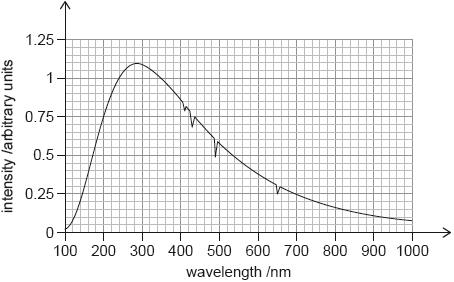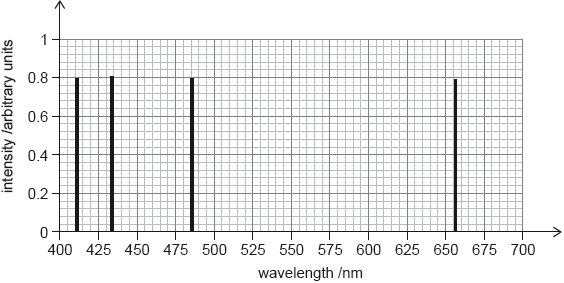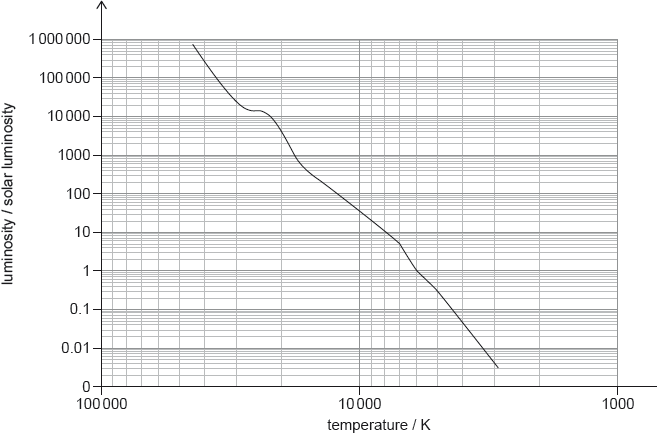| Date | May 2018 | Marks available | 1 | Reference code | 18M.3.SL.TZ1.11 |
| Level | Standard level | Paper | Paper 3 | Time zone | Time zone 1 |
| Command term | Write down | Question number | 11 | Adapted from | N/A |
Question
The graph shows the observed spectrum from star X.

The second graph shows the hydrogen emission spectrum in the visible range.

The following diagram shows the main sequence.

Suggest, using the graphs, why star X is most likely to be a main sequence star.
Show that the temperature of star X is approximately 10 000 K.
Write down the luminosity of star X (LX) in terms of the luminosity of the Sun (Ls).
Determine the radius of star X (RX) in terms of the radius of the Sun (Rs).
Estimate the mass of star X (MX) in terms of the mass of the Sun (Ms).
Star X is likely to evolve into a stable white dwarf star.
Outline why the radius of a white dwarf star reaches a stable value.
Markscheme
the wavelengths of the dips correspond to the wavelength in the emission spectrum
the absorption lines in the spectrum of star X suggest it contains predominantly hydrogen
OR
main sequence stars are rich in hydrogen
[2 marks]
peak wavelength: 290 ± 10 «nm»
T = \(\frac{{2.9 \times {{10}^{-3}}}}{{290 \times {{10}^{ - 9}}}}\) = «10 000 ± 400 K»
Substitution in equation must be seen.
Allow ECF from MP1.
[2 marks][
35 ± 5Ls
[1 mark]
\(\frac{{{L_{\text{X}}}}}{{{L_{\text{s}}}}} = \frac{{R_{\text{X}}^2 \times {\text{T}}_{\text{X}}^4}}{{R_{\text{s}}^2 \times {\text{T}}_{\text{s}}^4}}\)
OR
\({R_{\text{X}}} = \sqrt {\frac{{{L_{\text{X}}}{\text{T}}_{\text{s}}^4}}{{{L_s}{\text{T}}_{\text{X}}^4}}} \times {R_{\text{s}}}\)
\({R_{\text{X}}} = \sqrt {\frac{{35 \times {{6000}^4}}}{{10\,{{000}^4}}}} \times {R_{\text{s}}}\) (mark for correct substitution)
RX = 2.1Rs
Allow ECF from (b)(i).
Accept values in the range: 2.0 to 2.3Rs.
Allow TS in the range: 5500 K to 6500 K.
[3 marks]
MX = \({(35)^{\frac{1}{{3.5}}}}\)Ms
MX = 2.8Ms
Allow ECF from (b)(i).
Do not accept MX = (35)\(^{\frac{1}{{3.5}}}\) for first marking point.
Accept values in the range: 2.6 to 2.9Ms.
[2 marks]
the star «core» collapses until the «inward and outward» forces / pressures are balanced
the outward force / pressure is due to electron degeneracy pressure «not radiation pressure»
[2 marks]

